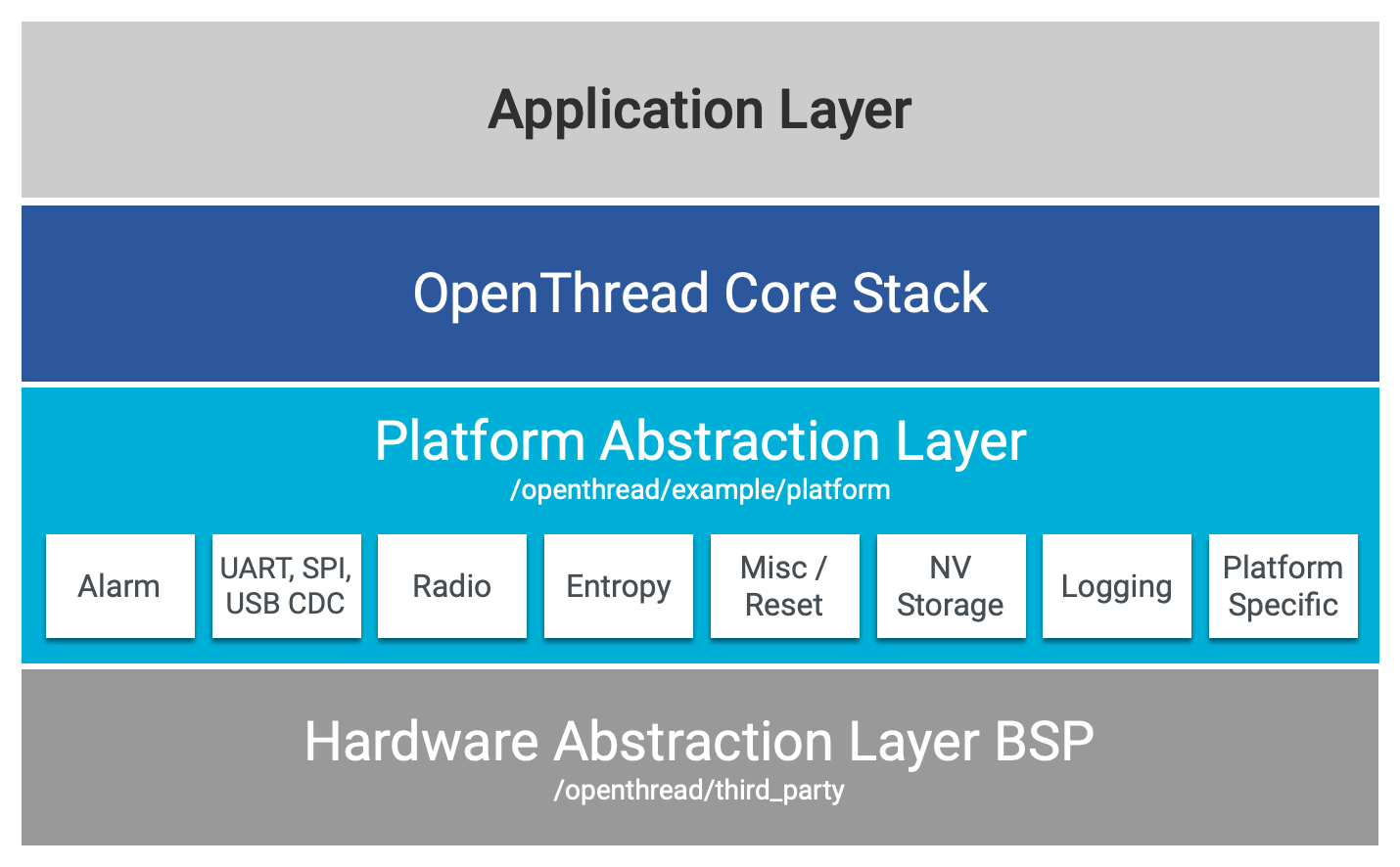OpenThread is OS and platform agnostic, with a narrow Platform Abstraction Layer (PAL). This PAL defines:

- Alarm interface for free-running timer with alarm
- Bus interfaces (UART, SPI) for communicating CLI and Spinel messages
- Radio interface for IEEE 802.15.4-2006 communication
- GCC-specific initialization routines
- Entropy for true random number generation
- Settings service for non-volatile configuration storage
- Logging interface for delivering OpenThread log messages
- System-specific initialization routines
All APIs should be implemented based on the underlying Hardware Abstraction Layer (HAL) Build Support Package (BSP).
API files should be placed in the following directories:
| Type | Directory |
|---|---|
| Platform-specific PAL implementation | /openthread/examples/platforms/platform-name |
| Header files — Non-volatile storage API | /openthread/examples/platforms/utils |
| All other header files | /openthread/include/openthread/platform |
| HAL BSP | /openthread/third_party/platform-name |
Alarm
API declaration:
/openthread/include/openthread/platform/alarm-milli.h
The Alarm API provides fundamental timing and alarm services for the upper layer timer implementation.
There are two alarm service types, millisecond and microsecond. Millisecond is required for a new hardware platform. Microsecond is optional.
UART
API declaration:
/openthread/examples/platforms/utils/uart.h
The UART API implements fundamental serial port communication via the UART interface.
While the OpenThread CLI and NCP add-ons depend on the UART interface to interact with the host side, UART API support is optional. However, even if you do not plan to use these add-ons on your new hardware platform example, we highly recommend you add support for a few reasons:
- The CLI is useful for validating that the port works correctly
- The Harness Automation Tool uses the UART interface to control OpenThread for testing and certification purposes
If the target hardware platform supports a USB CDC module rather than UART, make sure to:
- Install the correct USB CDC driver on the host side
- Replace the UART API implementation with the USB CDC driver (along with BSP) on the OpenThread side, using the same function prototypes
Radio
API declaration:
/openthread/include/openthread/platform/radio.h
The Radio API defines all necessary functions called by the upper IEEE 802.15.4 MAC layer. The Radio chip must be fully compliant with the 2.4GHz IEEE 802.15.4-2006 specification.
Due to its enhanced low power feature, OpenThread requires all platforms to
implement auto frame pending (indirect transmission) by default, and the source
address match table should also be implemented in the radio.h source file.
However, if your new hardware platform example is resource limited, the source address table can be defined as zero length. See Auto Frame Pending for more information.
Misc/Reset
API declaration:
/openthread/include/openthread/platform/misc.h
The Misc/Reset API provides a method to reset the software on the chip, and query the reason for last reset.
Entropy
API declaration:
/openthread/include/openthread/platform/entropy.h
The Entropy API provides a true random number generator (TRNG) for the upper layer, which is used to maintain security assets for the entire OpenThread network. The API should guarantee that a new random number is generated for each function call. Security assets affected by the TRNG include:
- AES CCM nonce
- Random delayed jitter
- Devices' extended address
- The initial random period in the trickle timer
- CoAP token/message IDs
Note that many platforms have already integrated a random number generator, exposing the API in its BSP package. In the event that the target hardware platform does not support TRNG, consider leveraging ADC module sampling to generate a fixed-length random number. Sample over multiple iterations if necessary to meet the TRNG requirements (uint32_t).
When the macro MBEDTLS_ENTROPY_HARDWARE_ALT is set to 1, this API should
also provide a method to generate the hardware entropy used in the mbedTLS
library.
Non-volatile storage
API declarations:
/openthread/include/openthread/platform/flash.h
or
/openthread/include/openthread/platform/settings.h
The Non-volatile storage requirement can be satisfied by implementing one of the two APIs listed above. The Flash API implements a flash storage driver, while the Settings API provides functions for an underlying flash operation implementation to the upper layer.
These APIs expose to the upper layer:
- The available non-volatile storage size used to store application data (for example, active/pending operational dataset, current network parameters and thread devices' credentials for reattachment after reset)
- Read, write, erase, and query flash status operations
Use OPENTHREAD_CONFIG_PLATFORM_FLASH_API_ENABLE in your platform example's
core config file to indicate which API the platform should use. If set to 1,
the Flash API must be implemented. Otherwise, the Settings API must be
implemented.
This flag must be set in your
/openthread/examples/platforms/platform-name/openthread-core-platform-name-config.h
file.
Logging
API declaration:
/openthread/include/openthread/platform/logging.h
The Logging API implements OpenThread's logging and debug functionality, with multiple levels of debug output available. This API is optional if you do not plan to utilize OpenThread's logging on your new hardware platform example.
The highest and most detailed level is OPENTHREAD_LOG_LEVEL_DEBG, which
prints all raw packet information and logs lines through the serial port or on
the terminal. Choose a debug level that best meets your needs.
System-specific
API declaration:
/openthread/examples/platforms/openthread-system.h
The System-specific API primarily provides initialization and deinitialization operations for the selected hardware platform. This API is not called by the OpenThread library itself, but may be useful for your system/RTOS. You can also implement the initialization of other modules (for example, UART, Radio, Random, Misc/Reset) in this source file.
Implementation of this API depends on your use case. If you wish to use the generated CLI and NCP applications for an example platform, you must implement this API. Otherwise, any API can be implemented to integrate the example platform drivers into your system/RTOS.

